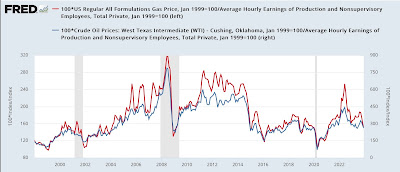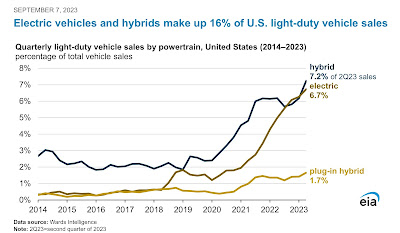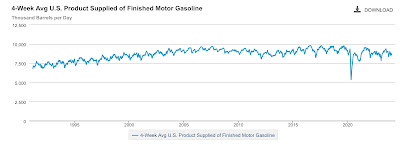As vehicles and outdoor appliances become increasingly electric, long term gas usage – and “real” prices – decline – by New Deal democrat What is the “real” cost of gasoline? When measuring this, some people compare with the CPI. But that actually just tells you the *relative* inflation in gas vs. other items. That’s why, for example, when I want to look at the “real” cost of housing, I measure against income, such as average hourly earnings. That tells you how much labor it costs the average person to buy an item. So here are oil prices (blue, right scale) and gas prices (red, left scale) divided by average hourly wages for nonsupervisory workers since 1998. I start here because gas prices hit a generational low of %excerpt%.80/gallon at the
Topics:
NewDealdemocrat considers the following as important: climate change, electricity, Gasoline and Oil Supplies, Outdoor Appliances, politics, US/Global Economics
This could be interesting, too:
Robert Skidelsky writes Lord Skidelsky to ask His Majesty’s Government what is their policy with regard to the Ukraine war following the new policy of the government of the United States of America.
Joel Eissenberg writes No Invading Allies Act
Ken Melvin writes A Developed Taste
Bill Haskell writes The North American Automobile Industry Waits for Trump and the Gov. to Act
As vehicles and outdoor appliances become increasingly electric, long term gas usage – and “real” prices – decline
– by New Deal democrat
What is the “real” cost of gasoline? When measuring this, some people compare with the CPI. But that actually just tells you the *relative* inflation in gas vs. other items. That’s why, for example, when I want to look at the “real” cost of housing, I measure against income, such as average hourly earnings. That tells you how much labor it costs the average person to buy an item.
So here are oil prices (blue, right scale) and gas prices (red, left scale) divided by average hourly wages for nonsupervisory workers since 1998. I start here because gas prices hit a generational low of $0.80/gallon at the beginning of 1999 – barely above where they were in 1974:
At their peak in July 2008, oil prices were 8x their price in wage-adjusted terms compared with 1999. Gas prices were almost 3x as high. At their pandemic lockdown lows, they were barely unchanged since 1999. Currently oil prices are 2.6x their cost in wages compared with their 1999 low. Gas at the pump is only 50% higher than 1999. This is on the low side of average since the big slide in prices 10 years ago in 2014.
Put another way, right now gas is relatively cheap compared with most of the past 25 years.
And there is good reason to believe that going forward oil price shocks will not be as big a deal as they have been over the past 50 years. That’s because many outdoor appliances like lawn mowers and leaf blowers are now electric powered. Even more importantly, in the past 3 years the percentage of new light vehicles sold that are hybrids or electric has risen from 5% to 16%:
I suspect if anything this trend is going to accelerate, as electric vehicles become less expensive and have increased range, and more two vehicle households buy at least one for shorter trips. Meanwhile hybrids have solved their previous issues with acceleration.
The effects of this can be seen in the weekly update of gasoline usage by the E.I.A., data on which goes back to 1991:
The all-time peak of gasoline usage was in August 2019, when nearly 9.8 million barrels were used per day. The post-pandemic peak was 9.528 million in August 2021. This past summer the peak was 9.388 million barrels.
As a bigger and bigger percentage of vehicles on the road are hybrids or EVs, I expect the decline in gas usage to continue. This in turn will lessen considerably the effect of oil price shocks in the future.



